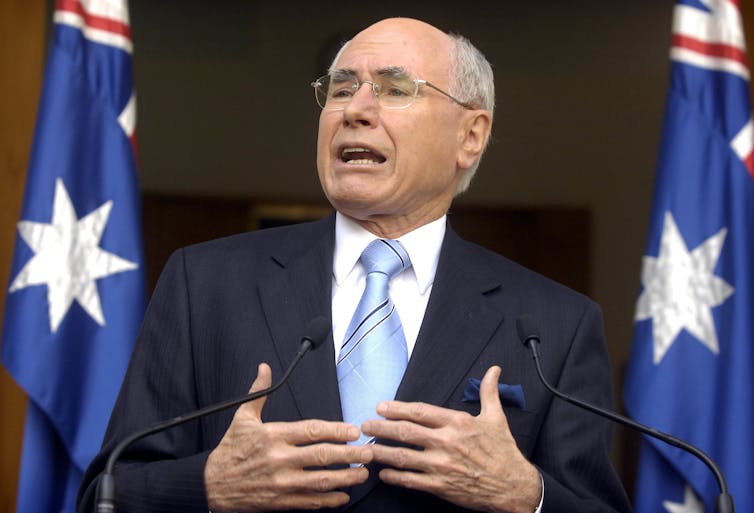ABC has for too long been unwilling to push back against interference – at its journalists' expense
- Written by Denis Muller, Senior Research Fellow, Centre for Advancing Journalism, University of Melbourne
For those who watch the affairs of the ABC through the eyes of a critical friend, the removal of Emma Alberici, made public on August 21, is deeply disturbing.
It is the climax to a destructive series of events that began more than two years ago and once again draws attention to two serious weaknesses in the ABC’s management arrangements.
One is structural: the editor-in-chief is fatally compromised in that role by also being managing director. The managing director has corporate responsibilities that conflict with his or her editorial responsibilities every time the government tightens the financial screws.
That is not a reflection on David Anderson’s character or probity; it is the inevitable consequence of having the one person in both roles.
It also happens that Anderson – like his ill-fated predecessor Michelle Guthrie – is not a journalist. This makes it hard for him to give the kind of editorial leadership the ABC requires.
The second weakness is cultural. This long pre-dates Anderson’s term and is the product of sustained hostility from successive Coalition governments going back to the start of the Howard prime ministership in 1996.
The preceding 12 years of the Hawke-Keating governments had hardly been a golden age for the ABC, but it generally got year-on-year funding increases.
And in the tough-minded minister for communications, Michael Duffy, it had a defender in cabinet who was prepared to confront Hawke and other ministers infuriated by some of the ABC’s reporting.
As for the three years of the Rudd-Gillard-Rudd interlude, Labor was too busy tearing itself to pieces to bother with the ABC.
 Concerted government attacks on the ABC began under John Howard.
Mark Graham/AAP
Concerted government attacks on the ABC began under John Howard.
Mark Graham/AAP
Now, according to Anderson, after six years of cumulative budget cuts by the Abbott-Turnbull-Morrison administrations, the total effective reduction in ABC funding will amount to A$105.9 million per year by 2022.
And as for defenders in cabinet, the present communications minister, Paul Fletcher, is as mute as a swan.
Clearly all this has sapped morale.
In September 2018, a dossier compiled by Michelle Guthrie was leaked, revealing an email in which Justin Milne, as chair of the ABC, told her to get rid of Alberici, declaring the government “hate her”.
Over the preceding months, the government had repeatedly criticised stories Alberici had done in her role as chief economics correspondent.
Guthrie’s dossier came to light in The Age and Sydney Morning Herald at a time when the ABC had decided to sack her. In the ensuing “firestorm” – Milne’s word – he was consumed as well.
Read more: ABC inquiry finds board knew of trouble between Milne and Guthrie, but did nothing
Milne had been concerned also with the work of political editor Andrew Probyn. He wanted Guthrie to “shoot” Probyn because the government hated him too and his continued presence was putting at risk half-a-billion dollars in funding for the ABC.
Assuming Milne and Guthrie were telling the truth, there could not be a clearer instance of how the government was using funding to undermine the ABC’s editorial independence.
The effects of this sustained intimidation are felt a long way down the ABC’s editorial food chain.
In May 2018, Barnaby Joyce accepted a reported $150,000 fee to appear with his lover on Channel Seven and talk about the affair that ended Joyce’s marriage and was a breach of the ministerial code of conduct. The ABC asked me to write a commentary on it.
I filed an article saying Joyce’s decision to take money for telling a story that concerned his public duties called into question his fitness for public office.
There was an awkward response from within the ABC indicating some disquiet further up the line. Would I mind not saying that about Joyce?
The rest of that exchange was off the record, but suffice to say I minded very much and withdrew the article. It later appeared unchanged in The Conversation and The Age.
That incident – small in itself but large in principle – revealed a malaise in editorial leadership at several levels.
Four months later came the revelations in Guthrie’s dossier about Milne’s attempts to have Probyn and Alberici sacked. It seems reasonable to infer word was filtering down from the top that if the ABC wanted to avoid yet more trouble from the government, it had better mind its manners.
 Justin Milne told Michelle Guthrie to sack Emma Alberici and Andrew Probyn because the government hated them.
Joel Carrett/AAP
Justin Milne told Michelle Guthrie to sack Emma Alberici and Andrew Probyn because the government hated them.
Joel Carrett/AAP
Alberici is now gone anyway, part of a wave of 200 redundancies announced by Anderson in June in response to the latest round of budget cuts.
It is clear from a leak of correspondence between her lawyer and the ABC the parting was anything but amicable, having finished up in the Fair Work Commission.
Her position as chief economics correspondent had been abolished and she was offered positions as a presenter. Alberici tweeted she wanted a reporting job.
So the ghosts of Justin Milne, Malcolm Turnbull and Michelle Guthrie continue to haunt the ABC.
The board that presided over the Milne-Guthrie implosion is still largely intact, despite having come out badly from a Senate inquiry into that debacle.
The committee of inquiry said:
This catalogue of events may give rise to the perception that the ABC Board had not been sufficiently active in protecting either the ABC’s independence from political interference or its own integrity.
And the structural and cultural weaknesses laid bare by the saga remain.
The strategy the Howard government developed for dealing with the ABC – funding cuts, pointless inquiries and cultural warfare – is being followed to the letter by the present government.
2017 was a vintage year, and sums up the problems:
Abbott’s cuts from three years earlier were working their way through the system
Pauline Hanson, smarting from a Four Corners investigation, secured a promise from the government to hold an inquiry into whether the ABC and SBS operated on a “level playing field” (Answer: yes they did)
in the marriage equality “debate”, a Liberal frontbencher, Zed Seselja, went on Murdoch’s Sky television service to accuse the ABC of campaigning for the “yes” cause. Two hours later, the ABC’s editorial policy manager, Mark Maley, emailed staff warning them to be impartial in their coverage of the same-sex marriage debate.
One of history’s many lessons is that appeasement does not work. Editorial executives have one over-riding responsibility: to provide a safe environment in which their staff can do independent journalism, regardless of corporate, political or economic interests.
Part of that is having the professional experience to understand what is involved, which includes absorbing the bullying that comes from powerful people and, where necessary, hitting back.
There has been no sign the ABC’s journalists have been getting that kind of protection, least of all from the board.
Instead, they are at the mercy of a vindictive government, urged on by its mates in News Corporation, which has a vested interest in weakening the ABC and shamelessly campaigns for exactly that.
Authors: Denis Muller, Senior Research Fellow, Centre for Advancing Journalism, University of Melbourne





